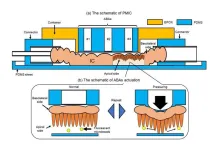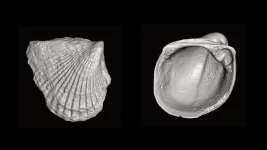(Press-News.org) Sophia Antipolis, 31 May 2023: Cancer patients who continue smoking after their diagnosis have a nearly doubled risk of heart attack, stroke or death due to cardiovascular disease compared with non-smokers, according to research published on World No Tobacco Day in European Heart Journal, a journal of the European Society of Cardiology (ESC).1
According to the World Health Organization, there were more than 50.5 million cancer survivors worldwide in 2020.2 Study author Dr. Hyeok-Hee Lee of Yonsei University College of Medicine, Seoul, Korea said: “A cancer diagnosis is an extremely stressful life event, which often leads to significant changes in a person's lifestyle. Smoking, in particular, is a health-related behaviour that can be heavily influenced by mental distress. However, little was known about the relationship between changes in smoking habits after a cancer diagnosis and the risk of cardiovascular disease—the leading cause of non-cancer-related death among cancer survivors.”
The researchers analysed data from a Korean national health claims database. The study included 309,095 cancer survivors who had never had a myocardial infarction or stroke. The median age was 59 years and 52% were women. Participants had health examinations both before and after their cancer diagnosis during which smoking status was assessed using a self-reported questionnaire. Patients were divided into four groups based on their change in smoking habits after receiving a cancer diagnosis: (1) sustained non-smokers, (2) quitters, (3) initiators/relapsers and (4) continuing smokers.
Of the 309,095 cancer survivors, 250,102 (80.9%) sustained non-smoking, 31,121 (10.1%) quit smoking, 4,777 (1.5%) initiated or relapsed to smoking, and 23,095 (7.5%) continued smoking after being diagnosed with cancer. The proportion of initiators/relapsers and continuing smokers combined was highest in survivors of urinary tract cancer and lowest among breast cancer survivors.
The researchers assessed the risk of cardiovascular events (myocardial infarction, stroke or death due to cardiovascular disease) for each group during a median of 5.5 years. The analyses were adjusted for characteristics that could influence the association between smoking and cardiovascular events including age, sex, household income, residential area, alcohol, physical activity, body mass index, blood pressure, blood glucose, cholesterol level, number of other medical conditions, medications, cancer type and anti-cancer treatments.
Compared with sustained non-smoking, the risk of cardiovascular events during follow up was 86%, 51% and 20% higher among continuing smokers, initiators/relapsers and quitters, respectively. The findings were consistent for women and men, and when the risk of myocardial infarction, stroke and cardiovascular death were analysed separately.
The benefits of quitting were even higher when compared with continuing to smoke. Of those who were smokers before being diagnosed with cancer, 57% quit after finding out they had cancer. Smoking cessation was associated with a 36% reduction in the risk of cardiovascular events compared with continued smoking.
Approximately one in five patients who continued smoking reduced their daily tobacco consumption by at least 50% after receiving their cancer diagnosis. Patients who continued smoking, but smoked less, after learning they had cancer had the same risk of cardiovascular events as those who continued smoking with no reduction. “Some individuals may find solace in successfully reducing their smoking without completely quitting,” said Dr. Lee. “However, our results imply that smoking less should not be the ultimate goal and that smokers should quit altogether to gain the benefits of kicking the habit entirely."
Of those who were non-smokers before their cancer diagnosis, 2% started or resumed smoking after finding out they had cancer. Smoking initiation or relapse was associated with a 51% elevation in the risk of cardiovascular disease compared with sustained non-smoking. Dr. Lee said: “Although our study does not provide conclusive evidence for the underlying causes of smoking initiation or relapse, some cancer survivors may lose motivation to have a healthy lifestyle after recovering, while others could turn to cigarettes as a way to cope with the stress of their diagnosis. These are only speculations, and further research is needed to determine factors associated with smoking initiation or relapse in cancer survivors.”
He concluded: “Our results reinforce the existing evidence on the well-known cardiovascular risks of tobacco smoking and emphasise the benefits of smoking cessation, even for cancer survivors. Additionally, the finding that over 40% of patients who had been smoking before their cancer diagnosis continued to smoke afterwards highlights the need for more robust efforts to promote smoking cessation among cancer survivors, who already have an elevated risk of cardiovascular disease compared to their peers.”3
ENDS
Authors: ESC Press Office
Tel: +33 (0)489 872 075
Email: press@escardio.org
Follow us on Twitter @ESCardioNews
Funding: This work was supported by the Korea Health Technology R&D Project and the MDPhD/Medical Scientist Training Program through the Korea Health Industry Development Institute, funded by the Ministry of Health and Welfare, Republic of Korea [grant number HI19C1211]; the National Research Foundation of Korea (NRF) grant funded by the Korea Ministry of Science and ICT [grant number 2022R1F1A1066181]; and the faculty research grant of Yonsei University College of Medicine [grant number 6-2022-0128].
Disclosures: Please see the paper.
References and notes
1Lee HH, Lee H, Bhatt DL, et al. Smoking habit change after cancer diagnosis: Effect on cardiovascular risk. Eur Heart J. 2023. doi:10.1093/eurheartj/ehad199.
Link will go live on publication:
https://academic.oup.com/eurheartj/article-lookup/doi/10.1093/eurheartj/ehad199
2World Health Organization, International Agency for Research on Cancer: Estimated number of prevalent cases in 2020, World, both sexes, all ages.
3Florido R, Daya NR, Ndumele CE, et al. Cardiovascular disease risk among cancer survivors: the Atherosclerosis Risk In Communities (ARIC) study. J Am Coll Cardiol. 2022;80:22–32.
About the European Society of Cardiology
The European Society of Cardiology brings together health care professionals from more than 150 countries, working to advance cardiovascular medicine and help people lead longer, healthier lives.
About European Heart Journal
European Heart Journal (EHJ) is the flagship journal of the European Society of Cardiology. It is the world’s leading publication in general cardiology. Please acknowledge the journal as a source in any articles.
END
Cancer survivors who quit smoking have 36% lower cardiovascular risk than continuers
2023-05-31
ELSE PRESS RELEASES FROM THIS DATE:
More depressed patients than previously estimated could have increased activation of their immune system
2023-05-31
New research from the Institute of Psychiatry, Psychology & Neuroscience (IoPPN) at King’s College London has used an assessment of gene expression involved in the immune response to show that there could be more patients with MDD with activated immune systems than research has previously estimated.
By identifying the molecular mechanisms involved in this association, the research could pave the way to better identify those patients with an immune component to their depression which would potentially help to provide more personalised approaches to treatment ...
Shedding light on the complex flow dynamics within the small intestine
2023-05-31
Science is well aware of the important role that gut bacteria and their interactions with the gastrointestinal tract play in our overall health. Villi, tiny finger-like structures that line the inside of the small intestine (SI), are known to interact with the gut bacteria and trigger a protective immune response. Despite researching into the molecular mechanisms underlying these interactions, however, not much is known about the dynamics of liquid flow around the villi.
While computer simulations have aided such observations, ...
UK cardiology societies issue joint policy statement to stamp out bullying, harassment, and discrimination in the specialty
2023-05-31
The British Junior Cardiologists’ Association (BJCA) and the British Cardiovascular Society (BCS) have issued a joint position statement in a bid to stamp out bullying, harassment, discrimination and other “unacceptable” and “unprofessional” behaviours in the specialty.
The statement, published online in the journal Heart, urges every cardiology team member to call out these behaviours to drive culture change.
Endorsed by 19 organisations affiliated with the BCS, the statement represents a specialty-wide response to the issue.
It comes in the wake of evidence suggesting ...
Predominance of young Asian men among large UK case series of laughing gas users
2023-05-31
The largest clinical case series to date of recreational users of nitrous oxide, popularly known as laughing gas, has found a predominance of young men of Asian ethnicity among those with neurological side effects who were seen at hospitals in 3 major cities in England.
This may indicate genetic susceptibility to the nerve damage caused by exposure to the gas, or other, as yet unidentified, social factors, suggest the researchers by way of an explanation for the finding, published online in the Journal of Neurology, Neurosurgery & Psychiatry.
Nitrous oxide is widely used as an anaesthetic in people and animals, ...
Ketamine nasal spray may prove safe and effective treatment for refractory migraine
2023-05-31
Ketamine taken in the form of a nasal spray may prove a safe and effective treatment for refractory chronic migraine, suggests a single centre study, published in the open access journal Regional Anesthesia & Pain Medicine.
It’s a more convenient alternative to intravenous infusion—the usual method of administration for these patients—but the potential for overuse means that it should be reserved for those in whom other treatment approaches have failed, caution the researchers.
Several clinical trials have shown ...
The clams that fell behind, and what they can tell us about evolution and extinction
2023-05-31
Every so often, life on Earth steps onto a nearly empty playing field and faces a spectacular opportunity. Something major changes—in the atmosphere or in the oceans, or in the organisms themselves —and the existing species begin to branch out into a brand-new world. Scientists are fascinated by this process, because it’s a unique look into evolution at pivotal moments in the history of life.
A new study led by scientists with the University of Chicago examined how bivalves—the group that includes clams, mussels, scallops, and oysters—evolved among many others in the period of rapid evolution known as the Cambrian Explosion. The team found ...
Medical school does not equip new doctors for the real working world, junior doctor warns
2023-05-31
Clinician burnout and overwork are known to adversely affect patient safety and junior doctors may be particularly vulnerable, research suggests.
The UK is facing a crisis in recruitment and retention in medicine, with a recent survey by the British Medical Association reporting that 4 in 10 junior doctors will quit their roles as soon as they find another job.
Considering the immense pressure doctors are under, with their decisions having the potential to shape the course of patients’ illnesses and even their lives, is a balanced and happy life as a doctor still possible?
In a new book released today titled The Bleep Test, junior doctor Luke Austen has combined ...
Unique “bawdy bard” act discovered, revealing 15th-century roots of British comedy
2023-05-31
University of Cambridge media release
UNDER STRICT EMBARGO UNTIL 00:01AM (UK TIME) ON WEDNESDAY 31ST MAY 2023
An unprecedented record of medieval live comedy performance has been identified in a 15th-century manuscript. Raucous texts – mocking kings, priests and peasants; encouraging audiences to get drunk; and shocking them with slapstick – shed new light on Britain’s famous sense of humour and the role played by minstrels in medieval society.
The texts contain the earliest recorded use of ‘red herring’ in English, extremely rare forms of medieval literature, as well as a ...
Saved from extinction, Southern California’s Channel Island Foxes now face new threat to survival
2023-05-31
Tiny foxes — each no bigger than a five-pound housecat — inhabiting the Channel Islands off the coast of Southern California were saved from extinction in 2016. However, new research reveals that the foxes now face a different threat to their survival.
Suzanne Edmands, professor of biological sciences at USC Dornsife College of Letters, Arts and Sciences, and Nicole Adams, who earned her PhD from USC Dornsife in 2019, found that the foxes’ genetic diversity has decreased over time, possibly jeopardizing their survival ...
Genetic change increased bird flu severity during U.S. spread
2023-05-31
(MEMPHIS, Tenn. – May 29, 2023) St. Jude Children’s Research Hospital scientists discovered how the current epizootic H5N1 avian influenza virus (bird flu) gained new genes and greater virulence as it spread west. Researchers showed that the avian virus could severely infect the brains of mammalian research models, a notable departure from previous related strains of the virus. The researchers genetically traced the virus’ expansion across the continent and its establishment in wild waterfowl populations to understand what makes it so different. The study was recently published in Nature Communications.
“We ...



